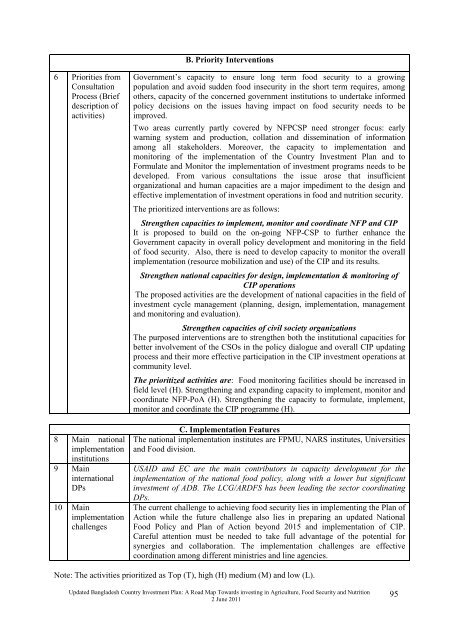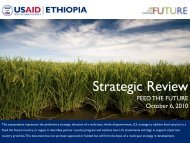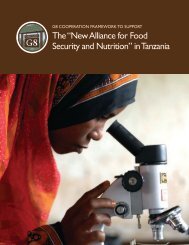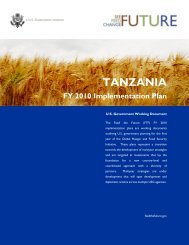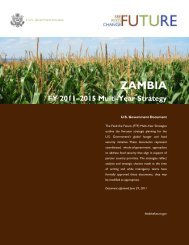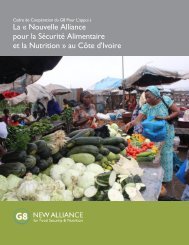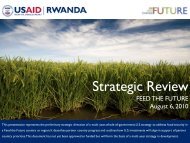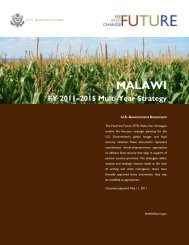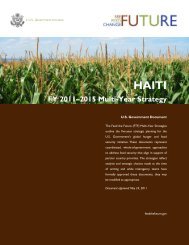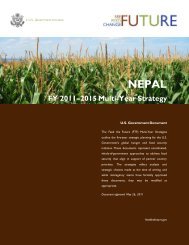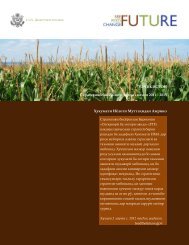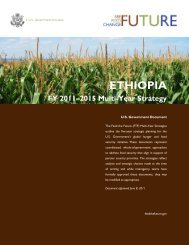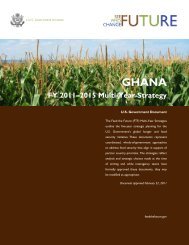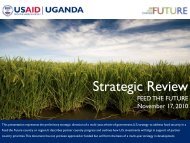Bangladesh Country Investment Plan - Feed the Future
Bangladesh Country Investment Plan - Feed the Future
Bangladesh Country Investment Plan - Feed the Future
You also want an ePaper? Increase the reach of your titles
YUMPU automatically turns print PDFs into web optimized ePapers that Google loves.
B. Priority Interventions<br />
6 Priorities from<br />
Consultation<br />
Process (Brief<br />
description of<br />
activities)<br />
8 Main national<br />
implementation<br />
institutions<br />
9 Main<br />
international<br />
DPs<br />
10 Main<br />
implementation<br />
challenges<br />
Government’s capacity to ensure long term food security to a growing<br />
population and avoid sudden food insecurity in <strong>the</strong> short term requires, among<br />
o<strong>the</strong>rs, capacity of <strong>the</strong> concerned government institutions to undertake informed<br />
policy decisions on <strong>the</strong> issues having impact on food security needs to be<br />
improved.<br />
Two areas currently partly covered by NFPCSP need stronger focus: early<br />
warning system and production, collation and dissemination of information<br />
among all stakeholders. Moreover, <strong>the</strong> capacity to implementation and<br />
monitoring of <strong>the</strong> implementation of <strong>the</strong> <strong>Country</strong> <strong>Investment</strong> <strong>Plan</strong> and to<br />
Formulate and Monitor <strong>the</strong> implementation of investment programs needs to be<br />
developed. From various consultations <strong>the</strong> issue arose that insufficient<br />
organizational and human capacities are a major impediment to <strong>the</strong> design and<br />
effective implementation of investment operations in food and nutrition security.<br />
The prioritized interventions are as follows:<br />
Streng<strong>the</strong>n capacities to implement, monitor and coordinate NFP and CIP<br />
It is proposed to build on <strong>the</strong> on-going NFP-CSP to fur<strong>the</strong>r enhance <strong>the</strong><br />
Government capacity in overall policy development and monitoring in <strong>the</strong> field<br />
of food security. Also, <strong>the</strong>re is need to develop capacity to monitor <strong>the</strong> overall<br />
implementation (resource mobilization and use) of <strong>the</strong> CIP and its results.<br />
Streng<strong>the</strong>n national capacities for design, implementation & monitoring of<br />
CIP operations<br />
The proposed activities are <strong>the</strong> development of national capacities in <strong>the</strong> field of<br />
investment cycle management (planning, design, implementation, management<br />
and monitoring and evaluation).<br />
Streng<strong>the</strong>n capacities of civil society organizations<br />
The purposed interventions are to streng<strong>the</strong>n both <strong>the</strong> institutional capacities for<br />
better involvement of <strong>the</strong> CSOs in <strong>the</strong> policy dialogue and overall CIP updating<br />
process and <strong>the</strong>ir more effective participation in <strong>the</strong> CIP investment operations at<br />
community level.<br />
The prioritized activities are: Food monitoring facilities should be increased in<br />
field level (H). Streng<strong>the</strong>ning and expanding capacity to implement, monitor and<br />
coordinate NFP-PoA (H). Streng<strong>the</strong>ning <strong>the</strong> capacity to formulate, implement,<br />
monitor and coordinate <strong>the</strong> CIP programme (H).<br />
C. Implementation Features<br />
The national implementation institutes are FPMU, NARS institutes, Universities<br />
and Food division.<br />
USAID and EC are <strong>the</strong> main contributors in capacity development for <strong>the</strong><br />
implementation of <strong>the</strong> national food policy, along with a lower but significant<br />
investment of ADB. The LCG/ARDFS has been leading <strong>the</strong> sector coordinating<br />
DPs.<br />
The current challenge to achieving food security lies in implementing <strong>the</strong> <strong>Plan</strong> of<br />
Action while <strong>the</strong> future challenge also lies in preparing an updated National<br />
Food Policy and <strong>Plan</strong> of Action beyond 2015 and implementation of CIP.<br />
Careful attention must be needed to take full advantage of <strong>the</strong> potential for<br />
synergies and collaboration. The implementation challenges are effective<br />
coordination among different ministries and line agencies.<br />
Note: The activities prioritized as Top (T), high (H) medium (M) and low (L).<br />
Updated <strong>Bangladesh</strong> <strong>Country</strong> <strong>Investment</strong> <strong>Plan</strong>: A Road Map Towards investing in Agriculture, Food Security and Nutrition<br />
2 June 2011<br />
95


